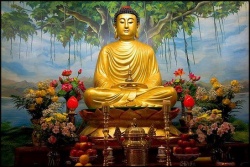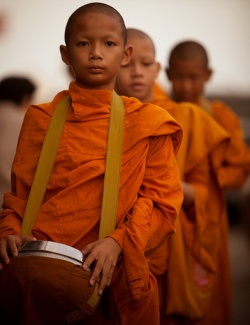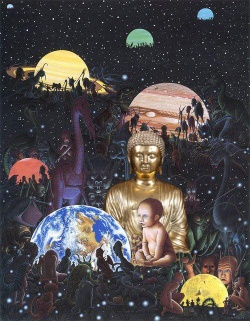Thirty-two features
thirty-two features
三十二相 (Jpn sanjuni-so )
Remarkable physical characteristics attributed to Buddhas, bodhisattvas, Brahma, Shakra, and wheel-turning kings, symbolizing their superiority over ordinary people.
They are:
(1) flat soles,
(2) markings of a thousand-spoked wheel on the soles,
(3) long, slender fingers,
(4) broad, flat heels,
(5) webbed feet and hands,
(6) extremely flexible limbs,
(7) protuberant insteps,
(8) slender legs like those of a deer,
(9) hands that extend past the knees even in a standing position,
(10) concealed genitals,
(11) body height equal to arm span,
(12) body hair that turns upward,
(13) one hair growing from each pore,
(14) golden skin,
(15) light radiating from the body,
(16) thin pliant skin,
(17) well-developed muscles of the hands, feet, shoulders, and nape of neck,
(18) well-developed muscles below the armpits,
(19) a dignified torso like that of a lion,
(20) a large and straight body,
(21) substantial shoulders,
(22) forty teeth,
(23) even teeth,
(24) four white fangs,
(25) full cheeks like those of a lion,
(26) an unexcelled sense of taste,
(27) a long broad tongue, (28) a pure and far-reaching voice,
(29) eyes the color of blue lotus blossoms,
(30) long eyelashes like those of a cow,
(31) a knot of flesh on the head like a topknot, and
(32) a tuft of white hair between the eyebrows, curling to the right.
The descriptions and order of these features differ slightly among the Buddhist scriptures. According to The Treatise on the Great Perfection of Wisdom, they are acquired one by one as a result of good causes made over a total of three asamkhya kalpas and one hundred major kalpas. Great Perfection of Wisdom also says that in the case of a wheel-turning king these marks are somewhat vague and unstable, while in the case of a Buddha they are obvious and stable. The Buddha is often referred to as possessing the "thirty-two features and eighty characteristics," the eighty characteristics being another set of remarkable qualities possessed by Buddhas and bodhisattvas.


